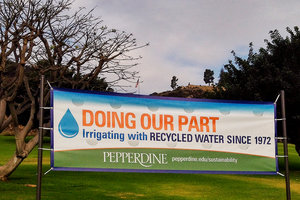Pepperdine University's Sustainability Policy

Pepperdine University is committed to managing our resources in an ethical, practical, and purposeful manner that is consistent with our mission. We retain a steadfast and faithful focus on sustainability through communication of successes and challenges, implementation of practices, and education of those we are charged with serving. There is no greater role we can play in the sustainability field than to capture the hearts and minds of our students to strengthen them for lives of purpose, service, and leadership.
Context and History
Long before "green" became part of our common vernacular, Pepperdine University recognized our obligation to manage, conserve, and sustain natural resources. This duty arises out of our belief that we are called to respect and care for the awesome gifts that God has bestowed upon us. A handful of examples of our commitment follow.
Given our California location, water conservation is one of the most important sustainable practices we undertake. Pepperdine began using reclaimed water for campus irrigation in 1972. The most sophisticated hydrogeological monitoring program of any institution on the West Coast was implemented in 1987, allowing us to carefully monitor and reduce the irrigation water used on our 830-acre campus.
Pepperdine University seeks to improve air quality and reduce reliance on fossil fuels. Examples include our "rideshare" program, through the use of carpools, vanpools, and mass transit; our fleet of electric and hybrid vehicles; shuttle services; and on-campus housing for 52 percent of students and 119 faculty and staff residences.
Pepperdine's campus enhancement projects incorporate sustainable elements while retaining high-caliber operations. Examples of such measures include optimal solar orientation; energy-efficient glass, lighting, and climate-control systems; low -low toilets and showers; native vegetation; use of recycled and low-VOC building materials; natural-gas heating systems; chiller water cooling; and a campus energy-management system.
Pepperdine provides sustainable curriculum at every level of each of our schools. Courses range from International Environmental Law at the Caruso School of Law to Environmental and Natural Resource Economics at the School of Public Policy. Students and faculty participate in associations devoted to environmental consciousness from the Graziadio School's Net Impact to Seaver College's Surfrider Foundation. Faculty members actively conduct research in the sustainability and conservation fields from native vegetation restoration to grunion and newt ecology.
Our continuing commitment is also evidenced by the numbers. Renewable energy resources account for 16 percent of all energy used on campus, our verified diversion rate of recycled materials is 78 percent, and 30 percent of our meals come from local foods.
These are just a few of the many ways in which Pepperdine University's sustainable stewardship has shaped our operations and curriculum. Pepperdine continues to strive to incorporate sustainability into our everyday lives through everyday practices.
Purchasing Policies
It is the responsibility of all departments on campus to consider the environmental, social, and economic implications of their purchasing decisions. Specific considerations for regularly acquired products follow, but the intent of this policy is to apply this same calculus to each purchase made by a department or individual. To assist with this effort, Pepperdine University's Center for Sustainability will regularly disseminate information about the importance of sustainable purchasing, inform departments about these sustainable purchasing preferences, and provide guidance to any individuals or departments so requesting.
1.1 Electronics Purchasing
Pepperdine University will work toward increasing the procurement of electronics with certain environmental attributes. These include high-recycled content (e.g., over 75 percent), waste minimization, environmentally responsible production methods, demonstrable maximum durability or biodegradability, reparability, energy efficiency, and non-toxicity. Pepperdine University has a purchasing preference for products that are at least EPEAT Silver Certified, a system that helps purchasers evaluate, compare, and select electronic products based on these aforementioned attributes.
Pepperdine University also encourages departments to consider the availability of existing equipment prior to making new electronics purchases. For example, we encourage individuals to rely upon networked printers rather than purchasing individual printers.
1.2 Cleaning Products Purchasing
It is Pepperdine's preference to purchase and use environmentally preferable cleaning products whenever they perform satisfactorily and can be acquired at similar total value (i.e., cost/quality). Specifically, Pepperdine encourages the use of Green Seal- and EcoLogo-certified cleaning products whose standards are based on performance, health, and sustainability.
1.3 Office Paper Purchasing
Pepperdine University is committed to promoting the use of recycled paper and recommends that all departments use at least 30 percent post-consumer recycled paper for all printing jobs. While we encourage even higher recycled content, 30 percent post-consumer recycled content paper maintains high quality and is available at rates comparable to non-recycled content paper.